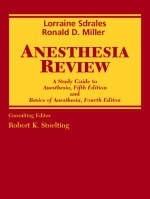
Anesthesia Review
Churchill Livingstone (Verlag)
978-0-443-07978-8 (ISBN)
- Titel ist leider vergriffen;
keine Neuauflage - Artikel merken
This is a question and answer review book that is cross-referenced to two of the leading textbooks in the specialty of anesthesia: Stoelting and Miller "Basics of Anesthesia 3e" and Miller "Anesthesia 5e". Designed for use by residents preparing for board certification and for practitioners preparing for theire re-certification exam, the book is presented in a straightforward format. Correct answers to all questions are given and readers are able to refer back to the corresponding section in the Miller or Stoelting and Miller books for more detailed information.
Lorraine M Sdrales, MD, Assistant Clinical Professor, Department of Anesthesia and Perioperative Care, University of California, San Francisco, School of Medicine, San Francisco, CA; Staff Anesthesiologist, Cedars-Sinai Medical Center, Los Angeles, CA Ronald D. Miller, MD, MS, Professor Emertius of Anesthesia and Perioperative Care, Department of Anesthesia and Perioperative Care, University of California, San Francisco, School of Medicine, San Francisco, California
BASICS PHARMACOLOGIC PRINCIPLES: What Does Pharmacokinetics Describe?. What Does Pharmacodynamics Describe?. What Is the Role of Receptors in Drug Pharmacology? TERMINOLOGY and DEFINITIONS: What Are Agonist Drugs?. What Are Antagonist Drugs?. Define Competitive and Noncompetitive Antagonism: Which of These Is Overcome By Higher Concentrations of the Drug?. What Does an Additive Drug Effect Mean?: Give an Example. What Does a Synergistic Drug Effect Mean?: Give an Example. When an Individual Is Referred to as Hyporeactive to a Drug, What Does It Mean? Hyperractive?. What Is Drug Tolerance?. What Is Drug Cross-Tolerance?. What Does Tachyphylaxis to a Drug Refer To?. How Do the Tissues of the Body Equilibrate with the Partial Pressure of the Inhaled Anesthetic?: Write the Equilibrium Equation for Equilibration of PI to Pbr. What Does the Alveolar Partial Pressure (PA) Reflect?: What Are Some Ways in Which It Is Used Clinically?. What Are the Six Factors that Act Simultaneously to Determine the PA?: How Much Does Metabolism and Percutaneous Loss of Inhaled Anesthetics Influence the PA. Of the Six Factors Listed Above, Which Three Determine the Inputof the Inhaled Anesthetic?. Of the Six Factors Listed Above, Which Three Determine the Uptake of the Inhaled Anesthetic?. How Much Does Metabolism and Percutaneous Loss of Inhaled Anesthetics Influence the PA?. What Is the Concentration Effect? Clinically, With Which Inhaled Agent Is the Concentration Effect Solely Possible? Why? /With Time, Should the PI Be Increased, Decreased, Or Kept Constant? Why?. What Would Happen if the PI Were Maintained Constant?. What Is the Second Gas Effect? Does This Depend on or Occur Independent of the Concentration Effect?. Give an Exmple of the Second Gas Effect. What Is Alveolar Hyperoxygenation? By What Percent Does the Pao2 Increase During Alveolar Hyperoxygenation?. Is the Second Gas Effect Clinically Significant?. How Does Increasing Alveolar Ventilation (VA) Affect the Induction of Inhaled Anesthesia?. What Is an Idiosyncratic Reaction to a Drug? What Does It Most Commonly Result From?. What Does a Dose-Response Curve Illustrate? Draw and Label One. How Is the Potency of a Drug Depicted on a Dose Response Curve?. What Does ED 50 Mean?. What Would Move the Curve to the Left? To the Right?. What Influences the Slope of a Dose-Response Curve?. What Does It Mean When the Curve Is Steep? What Is the Potential Clinical Problem Associated with a Steep Curve?. What Is a Drug's Efficacy? How Is It Depicted on the Dose-Response Curve?. What May Limit Drug Efficacy Clinically?. How Does Individual Variability Alter the Dose-Response Curve? PHARMACOKETICS of INHALED ANESTHETICS: What Does the Pharmacokinetics of Inhaled Anesthetics Describe? Where Is the Principal Site of Metabolism of Inhaled Anesthetics?. What Is the Objective of Inhalation Anesthesia?. How Does Controlling the Inspired Partial Pressure (PI) of an Inhaled Anesthetic Influence the Onset of Anesthesia?. How Do the Tissues of the Body Equilibrate with the Partial Pressure of the Inhaled Anesthetic? Write the Equilibrium Equation for Equilibration of PI to Pbr. What Does the Alveolar Partial Pressure (PA) Reflect? What Are Some Ways in Which It Is Used Clinically?. What Are the Six Factors that Act Simultaneously to Determine the PA? How Much Does Metabolism and Percutaneous Loss of Inhaled Anesthetics Influence the PA?. Of the Six Factors Listed Above, Which Three Determine the Input of the Inhaled Anesthetic?. Of the Six Factors Listed Above, Which Three Determine the Uptake of the Inhaled Anesthetic?. How Much Does Metabolism and Percutaneous Loss of Inhaled Anesthetics Influence the PA?. What Is the Concentration Effect? Clinically, With Which Inhaled Agent Is the Concentration Effect Solely Possible? Why?. With Time, Should the PI Be Increased, Decreased, Or Kept Constant? Why?. What Would Happen if the PI W Ere Maintained Constant?. What Is the Second Gas Effect? Does This Depend on or Occur Independent of the Concentration Effect?. Give an Exmple of the Second Gas Effect. What Is Alveolar Hyperoxygenation? By What Percent Does the Pa02 Increase During Alveolar Hyperoxygenation?. Is the Second Gas Effect Clinically Significant?. How Does Increasing Alveolar Ventilation (VA) Affec the Induction of Inhaled Anesthesia? ANSWERS
| Erscheint lt. Verlag | 12.6.2001 |
|---|---|
| Zusatzinfo | Illustd |
| Verlagsort | London |
| Sprache | englisch |
| Maße | 216 x 279 mm |
| Gewicht | 1365 g |
| Themenwelt | Medizin / Pharmazie ► Medizinische Fachgebiete ► Anästhesie |
| ISBN-10 | 0-443-07978-1 / 0443079781 |
| ISBN-13 | 978-0-443-07978-8 / 9780443079788 |
| Zustand | Neuware |
| Haben Sie eine Frage zum Produkt? |
aus dem Bereich


